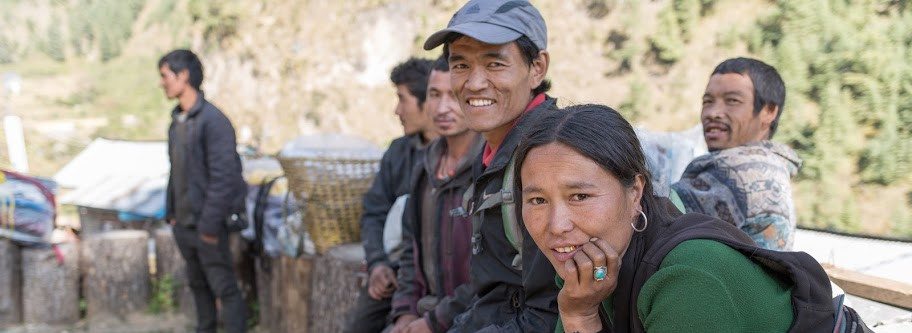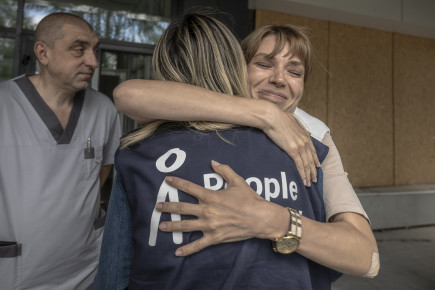People in Need provided support to more than 100,000 people after the devastating earthquake in Nepal. A year after the catastrophe, it continues to help with rebuilding houses and livelihoods
Published: Apr 19, 2016 Reading time: 7 minutes Share: Share an articleKathmandu (19 April 2016) – At the end of April 2015, Nepal was struck by the most destructive earthquake to have hit the country in the last 80 years, which claimed almost 9,000 lives, injured 22,000 people and left hundreds of thousands homeless. People in Need was directly engaged in the immediate humanitarian assistance that followed. A week after the earthquake, it was already distributing humanitarian aid meant to cover basic needs and materials for building temporary shelter to those most affected. Thanks to the SOS Nepál public appeal, the People in Need Club of Friends, the Czech Radio Endowment Fund, the EU and the support of other donors, aid was delivered to more than 100,000 people in the most severely hit areas of Nepal. The overall reconstruction and recovery of the country is nonetheless slow. A significant part of infrastructure has still not been restored. People who often have to cope with the loss of their livelihoods still live in temporary shelters. Having outlasted winter, they now prepare for the heavy monsoon rainy season. The work of the local People in Need team therefore still continues.

The 2015 destructive earthquake affected more than 8 million people. This natural disaster destroyed more than half a million homes and damaged other hundreds of thousands. Schools, hospitals and roads were as well destroyed. “Today, the vast majority of affected inhabitants continue to live in temporary shelters. At the moment, people wait impatiently for the government's contribution towards the repairs of their homes. Many of them lost their sources of livelihood, so it is almost impossible for them to invest in the reconstruction of houses or lost household equipment. The economic and social activity is thus returning to the affected areas at a very slow pace,” explains Denisa Bultasová, Coordinator of Programmes in Nepal at People in Need. “The situation is critical especially for displaced communities, which mostly had to leave their villages because of massive landslides. Currently, they live in temporary shelters with hardly any infrastructure and, most importantly, without land, on which they could start building permanent housing or community buildings. Our teams are working in several camps of internally displaced communities. Around June, monsoon rains will start again, and there is risk of further landslides,” adds Denisa Bultasová.
#~gallery-1385~#
Finding work is very difficult
In the district of Gorkha, the makeshift camp of Bamlackchok was set up, accommodating people from the area who were looking for shelter. For a long time they lived here simply under tarpaulins, at present however some of them have built temporary wooden houses. This is the case of Kapil Gurung, a father of two. “We had a beautiful house that I had only finished building a year ago. I took a loan on it and I was planning to leave for Malaysia in order to earn enough money so that I could pay it off. Then the misfortune came and took everything away from us,” he reminisces. “Now I most importantly have to look after my family. I need to pay off the loans and make money for a new house. Finding work around here is very difficult nowadays, but at the moment I do not want to go abroad,” saysKapil Gurung. “Thanks to People in Need, I have the opportunity to work on consolidating the local road in the village of Kerauja. Not only do I have the opportunity to earn money, but I am also pleased I am doing something that will be appreciated by the whole local community. The People in Need team moreover supplied us with stoves, helped us with the construction of provisional washroom facilities, and gave us blankets and solar lamps. Thanks to this, our current living conditions have somewhat improved,” he adds. Kapil Gurung has, as an experienced worker, joined the public works programme (“cash-for-work”). The participants of this programme mainly help with repairs to local infrastructure and environment restoration. At the same time, in this way they get the opportunity to make a living, so that they can provide for their families and give the local economy a boost.
Protection of women and children
Since the beginning of its activities in Nepal, People in Need has focused also on the protection of women and children from domestic and sexual violence, child marriage and human trafficking. In camps, where often whole local communities are displaced, there is a heightened risk of conflicts, assaults on women and human trafficking. People in Need seeks to ensure safety in camps and provide people with specialized training. In the camp of Khanchu in the Gorkha district, several new showers were set up, so that women could have more privacy. “In my old house I used to have my own bathroom. Because of the earthquake, I lost everything. In the camp I had to take showers in the common washroom, which was open to view from all sides. Since the new showers are here, we again have a bit of privacy. Recently lights were added to the toilets, which I think is really important. I and the other women were often afraid to go there at night,” says 26-year-old Sharmile Ghale, who came to the camp after the earthquake deprived her of her house and her small shop.
People in Need help in numbers:
14,320 households were assisted in repairing their temporary housing with materials and technical consultancy
10,623 households received household equipment, such as mattresses, blankets and solar lamps
48,993 people were helped with insulating their dwellings before winter, of which 11,958 of the most vulnerable groups (pregnant and breastfeeding mothers, seniors, disabled people and children under the age of 5)receivedwarm sleeping bags and clothes
8,678 people, living in camps for the internally displaced, were supported in ensuring better living conditions
8,678 people, mainly women and children, from villages and camps for the internally displaced, are better protected from violence and abuse
5,490 households received a financial contribution towards covering basic needs
1,648 students in their last years of middle school received books and school supplies for their preparation for school leaving exams
179 families, who lost their livelihood, received as a “Real Gift” two goats
54 tents serve as schools, infirmaries, administrative or community centres
2 model houses serve as an illustrative sample of how to build an earthquake-proof house
The assistance from People in Need also gets praise from Sharmile Ghale. “Before, we used to live well. I had my own small shop for students and tourists. Now, however, not many tourists come here and finding work is very difficult for us. Thanks to People in Need I am a member of a local group that fights against gambling and violence for example, I received a better stove for cooking and I have recently learned how to knit during a course. I really enjoy knitting, sometimes even I and the others knit when we carry loads,” says Sharmile Ghale smilingly.
When reconstructing, it is necessary to keep earthquakes in mind
In Nepal, People in Need focuses on the most severely hit and poorly accessible areas in the districts of Gorkha and Sindhupalchok.Our Nepalese team regularly delivers aid with the help of helicopters to cut-off mountain areas. “At the moment what is very important is restoring livelihood sources and repairing destroyed public infrastructure based on priorities set by the inhabitants of remote villages themselves. We would like to focus on this at least till the end of this year,” says Petr Drbohlav, Regional Coordinator for Asia at People in Need. “We are also trying to raise awareness about basic construction techniques and practices that would increase resistance to eventual earthquakes in the future. This is very important in the current phase of reconstruction. In the upcoming weeks, we therefore plan to also provide support to the most vulnerable families in order for them to be able to hire workforce, since these construction practices are often more labour-intensive and therefore more expensive,” he adds.
In 2015, People in Need launched the public appeal SOS Nepal to help earthquake victims, and in a great display of people's solidarity raised 33,300,000 CZK. Help in Nepal is also under way thanks to the significant support of donors to the People in Need Club of Friends, the Czech Radio Endowment Fund, the Department for International Development (DFID) of the British government, the Catholic Relief Services (CRS) organisation and the International Organization for Migration (IOM), the EU through the Directorate-General for Humanitarian Aid and Civil Protection of the European Commission (ECHO) and the Avast Foundation. People in Need is thankful to all donors who contributed to help in Nepal.
For more information please contact:
Denisa Bultasová, Coordinator of Programmes in Nepal at People in Need, + 420 777 257 960 denisa.bultasova@clovekvtisni.cz (till 22.4.)
Petr Drbohlav, Coordinator for Asia at People in Need, +420 724 329 285 petr.drbohlav@peopleinneed.cz (from 23.4.)



